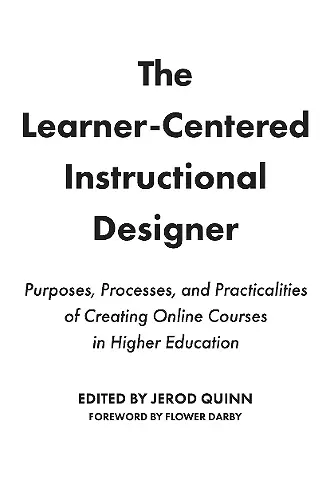The Learner-Centered Instructional Designer
Purposes, Processes, and Practicalities of Creating Online Courses in Higher Education
Jerod Quinn author Jerod Quinn editor
Format:Hardback
Publisher:Taylor & Francis Inc
Published:11th Nov '20
Currently unavailable, and unfortunately no date known when it will be back
This hardback is available in another edition too:
- Paperback£33.99(9781642670417)

“What does a new instructional designer need to know to find her or his feet when working with faculty to create online classes?” This is a practical handbook for established and aspiring instructional designers in higher education, readers who may also be identified by such professional titles as educational developer, instructional technologist, or online learning specialist. Jerod Quinn, together with a team of experienced instructional designers who have worked extensively with a wide range of faculty on a multiplicity of online courses across all types of institutions, offer key guiding principles, insights and advice on how to develop productive and collegial partnerships with faculty to deliver courses that engage students and promote enduring learning.Designing and developing online classes for higher education takes a combination of pedagogical knowledge, the ability to build trust with faculty, familiarity with frameworks on how people learn, understanding of accessibility and inclusion, and technical skills to leverage a learning management system into an educational experience. Coming from diverse backgrounds, few instructional designers enter academia well versed in all of these aspects of creating online classes. This book provides the foundation on which instructional designers can build their careers. The guiding principle that animates this book is that the student experience and successful learning outcomes are paramount, and governs discussion of course design, pedagogy, the use of multimedia and technological advances, as well as the use of different forms of interactive exercises and group assignments. The succinct, informally written chapters offer ideas and means to apply theory to the daily work of instructional design and cover the four key components that drive this work in higher education: ·Defining the scope and main design approaches of our work·Building trust with the faculty we work with·Applying frameworks of how people learn·Mastering common online instructional practices.
“Creating high-quality online courses involves more than writing objectives and content alignment. Instructional designers (IDs) must also learn to navigate the higher education landscape and build mutually respectful, collaborative relationships with faculty. The Learner-Centered Instructional Designer introduces the reader to multiple “mentors” who have mastered these challenges and come out the other side with concrete, practical advice. It serves as an excellent resource for IDs new to higher education.”
Andrea Gregg, Director of Online Pedagogy and Credentialing; Assistant Teaching Professor, Department of Mechanical Engineering, College of Engineering
The Pennsylvania State University
"The Learner-Centered Instructional Designer is the book I needed in my hands when I started in higher education instructional design. Quinn and colleagues have crafted a practical, affirming, and empowering book that will shape your practice and be a mainstay on your reading list. This book centers design practice on the things that matter most for instructional designers: collaboration, intentionality, and relationships. Every early career designer and design student should own this book."
Jason Drysdale, Director of Instructional Design & Program Development
University of Colorado
"The importance of excellent online education—And of well-equipped instructional designers—has never been clearer. The Learner-Centered Instructional Designer provides a guidebook for new designers navigating a complex role as guide, learner advocate, and design partner. Full of practical and immediately applicable strategies, each chapter puts the learner at the center, focusing on everything from productive consultations, skill-building, and key frameworks for learning and teaching, as well as ideas for further reading and professional development."
Deandra Little, assistant provost & director, Center for the Advancement of Teaching and Learning; professor of English
Elon University
ISBN: 9781642670400
Dimensions: unknown
Weight: 512g
276 pages